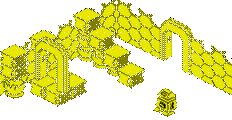Interview with Richard Hanson
RICHARD HANSON
2007 Interview with Stuart Goodwin
What were the titles you'd written for the Atom, and what sort of numbers was classed as a success at that point?
They were mainly fairly simple games (for example, a game called Demon Dungeon). There was also a music program (called Music Box) and a
disassembler utility. I think 1,000 sales of any title would have been considered to be quite successful at that time.
How did you find programming for the Atom? How did it compare to the BBC?Both computers used 6502 microprocessors, so the machine code programming was similar. Both also used versions of BASIC, although in a more advanced
form on the BBC Micro.
Was there a specific publisher or even a specific title on the market when you formed Superior that you thought was setting the standard as far as BBC games went? If so, who or what was it?Some of the Acornsoft games, such as Planetoid, were the early pacesetters in my opinion.
Earlier Superior releases were written by yourself and John Dyson. At what point did other programmers start approaching you with games they'd
written, and were there any that particularly stood out?At a fairly early stage we invited programmers to send in their software for evaluation. Peter Johnson, who wrote several games including a car-racing
game called Overdrive, was a very important programmer for Superior.
Were there any high profile rejections? In other words, did any titles come in that didn't make the grade, but were written by authors who went
on to find success in programming for the Acorns?I don't recall there being any.
Some programmers I've spoken to have mentioned problems with making games compatible with the Electron. What was Superior's experience of this?Electron compatibility aspects varied considerably from game to game; in some cases very little or no modifications were required, whereas in other
cases it could be a major upheaval. Compromises sometimes had to be made, particularly in respect of screen scrolling: several games use hardware
scrolling for the BBC Micro version and software scrolling for the Electron version.
How important was it to Superior to have games that played well on both?That was very important to us.
What did you make of the BBC B+ and Master Series? Did you ever release software catering specifically to these models?We occasionally released special BBC Master versions of games, containing enhanced graphics and music. One example was the game Stryker's Run.
What specific point would you say was the heyday of the BBC?It's difficult to determine a specific point, but the years 1983 to 1987 were probably the peak years of popularity.
Did this coincide with the heyday of Superior Software?Yes.
What were Superior's best-selling games, and approx how many did they sell?The Repton series of games has been Superior's biggest success story, selling over 125,000 in total.
How successful were the Acornsoft re-releases for you? Which games in particular sold well?Elite was a big seller for us in its re-released form. We were pleased with the sales of all of the Acornsoft re-releases.
Superior released or otherwise, what was your favourite title on the 8-bit Acorns?The Repton games are definitely my personal favourites.
Did you have a particular favourite programmer (or programmers)?I always enjoyed working with Peter Scott - a very skilled programmer, a great pleasure to work with, and a really nice guy.
How did Speech! come about, and how did you think it compared to Acorn's own speech chip?One of the BBC Micro programmers, David Hoskins, came up with the idea and created the software for SPEECH! Acorn's speech chip took a different route
in terms of using hardware, whereas SPEECH! was entirely software-based.
The Play It Again Sam compilations formed a large part of the software market in the BBC and Electron's later years. Was your original intention to re-release only Superior titles? If so, at what point did that change?The intention was initially to issue compilations of Superior's titles, but we decided soon after to ask other software companies whether they would
like some of their games to be included on the compilations - and almost all of the companies we approached were keen on the idea.
It was interesting that some previously unreleased games started finding their way on to the compilations. Why bundle them as opposed to giving
them an individual release?They were games that we felt deserved to be released, but possibly weren't strong enough to warrant individual release.
Coming a little more up-to-date, can you explain a little about Superior Interactive, and tell me about titles already on the market as well as
any upcoming titles that might appeal to veterans of the 8-bit Acorns? How vibrant is the market for these releases?Superior Interactive (www.superiorinteractive.com) is largely concentrating on PC software now. We currently have nine PC titles (Repton 1, Repton 2, Repton 3, Repton Spectacular, Ravenskull, Galaforce Worlds, Ricochet, Pipeline Plus and Solid Spheres Deluxe), which are mainly updated versions of BBC Micro games. We're pleased with the level of sales they've achieved so far, and we're currently working on several more games, including PC versions of Stryker's Run and Quest.
Interview by Stuart Goodwin, Autumn 2007.









